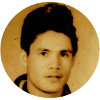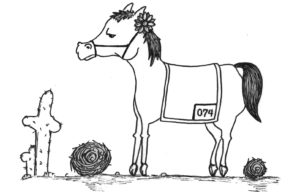
“Are you sure these were the correct parts?” grumbled Chano as he mopped the sweat off his brow, leaving a streak of grease that glistened in the early morning light. It was still a few minutes away to sunrise, but the temperature had already begun to climb.
“Wen met…” answered Pol, his expression both confused and worried. It was difficult to tell whether the dark spots on his shirt were oil stains or patches of sweat. “I- I don’t know why… it’s still not working.”
Perched atop each of the two massive radars, the pair of mechanics gazed off toward the distance in frustrated silence. The dawn’s indigo glow began to radiate over the rust-colored mountains, heralding the dreaded heat’s return. As the first rays of sunshine peeked through the eastern horizon, Chano glanced at the thermometer on his belt buckle—35 degrees and rising.
Nothing could stop the heat now.
On the opposite tower, Pol exhaled a resigned sigh. The seven days they were given had gone by too quickly, and they had nothing to show for it—except for a few burns and blisters from touching the radar too soon after the sun had set. It took an hour, sometimes two, for the towers’ metal to cool enough for the two mechanics to climb and begin their work. For the past week, from 8 in the evening to 5 in the morning, the duo toiled non-stop amid the silent, desolate, wasteland once known as Cabuyao.
“I’m going to get some water,” said Chano as he rappelled back down toward the ground.
“I don’t know. I don’t know…” muttered Pol to himself, deaf to everything but the burning question in his head. What were they going to do now?
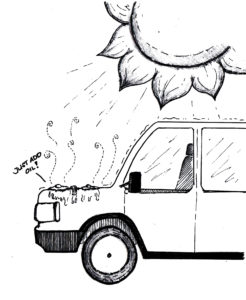
It had all begun suddenly, half a year ago. Rumors of record-setting droughts and heatwaves across the lowlands were first regarded as hearsay. “What else is new?” others joked. Stories of people frying eggs and cooking breakfast on the hood of their cars were thought to be hilarious—until those same folks drove their bacon-fat laden automobiles north in search of refuge. Within months, thousands of desperate people flocked toward the northern towns as low-lying regions deteriorated into parched desserts. Forests browned and swaths of lush farmland gave way to barren paddies complete with rolling tumbleweed. Global warming had apparently gone into overdrive, overnight. With a city crammed with sweaty, irritable, and literally hot-headed immigrants, the local politicians had to find a solution.
And one proposal was so crazy; they thought it just might work.
People called it a suicide mission, but the two volunteers were the only ones mad enough to consider traveling up the dry, abandoned mountain and repairing the radars in exchange for the fastest internet in Baguio, a lifetime’s supply of tapey, and 300 kilos of etag—things clearly worth dying for. And although resources were already in short supply, somehow the city was able to ship them both off with enough food, water, and alcohol to last a week. The latter, they both claimed, was in case one of them got “hurt” and needed prompt disinfection. No one was fooled, but the populace was ready to give anything to these two clowns who were willing to risk everything in a do-or-die mission.
As Chano sulked back to their “basecamp”—an old, dusty, military tent, now littered with empty water bottles and discarded food scraps—he climbed inside and plopped down on a mat, ready to do as they did the past week when the sun came shining: absolutely nothing. Jose Rizal once claimed that the tropical heat made the Filipino indolent. Well now it was extra hot, and so they were extra indolent. The thermometer on Chano’s buckle read 40 degrees. Barely ten minutes had passed since sunrise.
Dejected and dispirited, with virtually nothing left of their supplies, Chano reached for the last water bottle and popped the lid off. Just as he lifted it up to drink, a rogue grease stain on his glove caught the bottle’s edge and sent it sliding to the ground. The look of horror on Chano’s face was matched only in intensity by the rage on Pol’s, who just happened to walk into the tent.
“Graaah!” Pol screamed as he watched the precious fluid drain into the parched ground, “The water! What did you do to the water!? You stupid dumba-”
“It wasn’t my fault! It slipped!”
“I don’t care!”
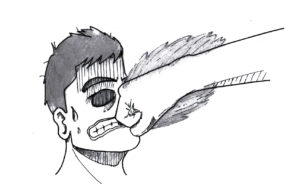
Balling his fists up in anger, Pol wasted no time in introducing his right hand to Chano’s nose, sending the latter flying out of the tent. With a bloodied muzzle and a bruised ego, Chano waited for Pol to storm out before greeting him with side-kick to the face in retaliation. Under the early morning sky, the two duked it out like drunken patrons on a BCS Saturday night—uncoordinated and kababain. The heat, a highlanders one weakness, had finally taken over their sensibilities. Pummeling each other while hurling expletives about the opposite’s intellect, each blow felt more like an expression of disappointment and exasperation in humanity’s greed and styrofoam packaging and CFC’s and plastic straws than as true anger for a partner who dropped a bottle of water.
Yanking a wrench from his work belt, Pol hurled it straight at Chano, who with the grace of a baby penguin, slipped on some dust, subsequently ducking the airborne tool. The metal instrument went flying towards one of the radars, clanking as it bounced and ricocheted from one post to another on its way to the ground. Miffed by the “airball” of sorts, Pol charged at Chano, who at this point prepared to tackle back.
In the 45-degree heat, flushed red and with nothing left to lose, the two locked eyes and barreled onto a collision course for each other.
But then a deep rumble shook the ground beneath them. Groans, akin to long-unused pipes filling with water, reverberated in the air. The pair stopped in their tracks as a mechanical whir started, building in intensity into a uniform hum. Pol and Chano turned their heads toward the cause of all this racket.
The radars, awakened by the stray flying wrench, had begun to run again; their true function rediscovered—as giant electric fans that blew cool wind for the city it overlooked.
The generating breeze began to lower the temperature almost immediately—a good thing, because Chano and Pol would’ve continued knocking each other’s teeth out in the heat.
It could be surmised that, in the end, cooler heads would prevail.
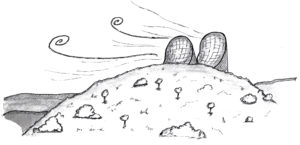
Copyright © 2018 Cousin from Baguio
